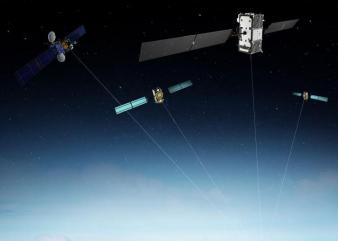The European GNSS Agency (GSA), along with the European GNSS Service Centre (GSC), announce the commissioning of two additional Galileo satellites, increasing the total number of satellites available for service provision to 16.
The GSA announced the completion of in-orbit testing (IOT) of two new Galileo satellites, GSAT0207–SV ID 07- and GSAT0214–SV ID 05-, which were launched in November last year. Having passed all initial tests, the two satellites are now officially commissioned for operational use and are usable for service provision, as stated in the most recent NAGUs published on the GSC web portal (NAGU 2017017 and NAGU 2017018).
(IOT) of two new Galileo satellites, GSAT0207–SV ID 07- and GSAT0214–SV ID 05-, which were launched in November last year. Having passed all initial tests, the two satellites are now officially commissioned for operational use and are usable for service provision, as stated in the most recent NAGUs published on the GSC web portal (NAGU 2017017 and NAGU 2017018).
The satellites were launched along with two others (GSAT0212 –SV ID 03- and GSAT0213 –SV ID 04-) from Kourou in French Guiana on November 17, 2016. They were the first to be launched using an Ariane-5 rocket.
Watch This: GSA ready for Initial Services
The two new satellites reinforce the provision of Galileo Initial Services, which were declared on December 15th, 2016. This will be further strengthened after the other two satellites launched in November also become commissioned. Additional satellites will be launched over the course of the coming years, enlarging the Galileo constellation and gradually improving Galileo’s global performance. The constellation is set to reach full operational capability in 2020.
About Galileo
Galileo is Europe's civilian global satellite navigation system. It allows users worldwide to know their exact position in time and space with great precision and reliability. Once complete, the Galileo system will consist of 30 satellites and the necessary ground infrastructure to enable the provision of positioning, navigation and timing services.
The Galileo programme is funded and owned by the European Union. The European Commission has the overall responsibility for the Galileo programme, managing and overseeing the implementation of all programme activities.
Galileo's deployment, the design and development of the new generation of systems and the technical development of infrastructure are entrusted to the European Space Agency (ESA). The definition, development and in-orbit validation phases of the Galileo programme were carried out by ESA, and co-funded by ESA and the European Commission.
The GSA is charged with ensuring the uptake and security of Galileo. As of 2017, the GSA is responsible for all Galileo operations and the provision of Galileo services.
Media note: This feature can be republished without charge provided the European GNSS Agency (GSA) is acknowledged as the source at the top or the bottom of the story. You must request permission before you use any of the photographs on the site. If you republish, we would be grateful if you could link back to the GSA website (http://www.gsa.europa.eu).